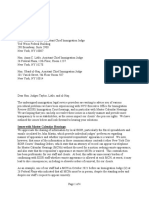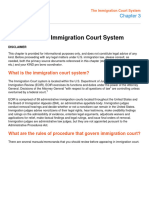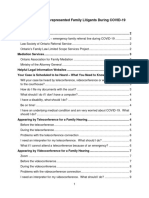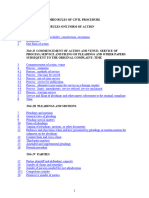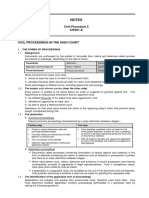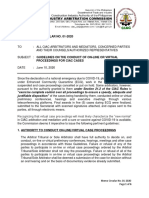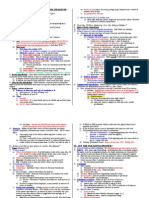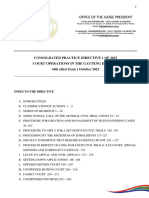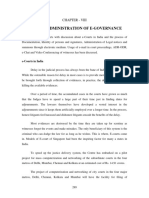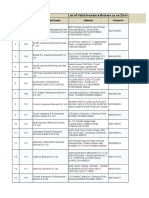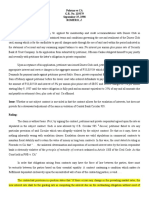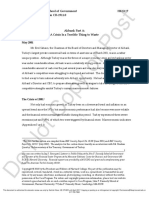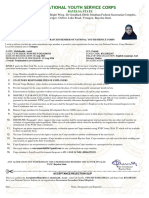DM 22-07
Issued: August 11, 2022
Effective: Immediately
INTERNET-BASED HEARINGS
PURPOSE: Provide guidance to immigration judges on internet-based video hearings
OWNER: David L. Neal, Director
AUTHORITY: 8 C.F.R. § 1003.0(b)
CANCELLATION: None
Hearings before immigration judges can be held both in-person, and with one or more
participants appearing by video or telephone from different locations outside the court.
Traditionally, the Executive Office for Immigration Review (EOIR) has used a closed video
teleconferencing system when a participant appears by video. With the advent of internet-based
video teleconferencing, EOIR is currently allowing participants to appear through the platform
Webex by Cisco. EOIR anticipates that hearings using Webex or other, similar platforms will
remain important to EOIR’s operations in the future. This memorandum will refer to such
hearings as “internet-based hearings.” This memorandum discusses internet-based hearings and
sets out guidelines to apply to such hearings across the immigration courts going forward.
Several configurations for internet-based hearings are possible. The immigration judge can
conduct a hearing in person, with one or both parties appearing by video from outside the court.
Or one or both parties can appear in court and the immigration judge can conduct a hearing by
video from outside the court. Or the immigration judge and both parties can all participate by
video from outside the court. Each of these scenarios can be described as an “internet-based
hearing” as each involves at least one participant appearing by video over an internet-based
platform. Each is distinguished from a traditional, in-person hearing where the immigration
judge and all other participants appear in a courtroom.
EOIR is authorized by law to hold internet-based hearings. Under the Immigration and
Nationality Act (Act), hearings in removal proceedings can take place by video conference. See
section 240(b)(2)(A), (B) of the Act. An immigration judge is permitted to “conduct hearings
through video conference to the same extent as he or she may conduct hearings in person.” 8
C.F.R. § 1003.25(c); see also section 240(b)(2)(B) of the Act. EOIR accordingly has wide
latitude by statute and regulation to hold internet-based hearings since internet-based platforms
1
�provide video conference capabilities that are equivalent to, or better than, the closed video
teleconference systems traditionally used by EOIR.
EOIR began routinely holding internet-based hearings through Webex during the COVID-19
pandemic, and all immigration courts now have the capacity to hold such hearings. Internet-
based hearings have proven a valuable safety measure during the pandemic, as immigration
judges can conduct such hearings without requiring groups of people to congregate in a
courtroom. EOIR anticipates that, going forward, internet-based hearings will remain essential
to EOIR’s operations. For example, holding internet-based hearings can assist EOIR in moving
its docket in a locale with limited courtroom space. Parties – both respondents and the
Department of Homeland Security – can benefit from internet-based hearings, such as when
courts can schedule individual calendar hearings sooner if held by video. Respondents and
counsel appearing remotely are relieved from traveling to court. Internet-based hearings make it
easier for parties to present witnesses, including expert witnesses, as parties can avoid the costs
and complications of witness travel.
Guidelines for internet-based hearings are as follows.
• The decision whether the immigration judge appears in court or remotely rests with the
court and is made in accordance with agency policy and operational needs.
• The decision whether the respondent and counsel appear in court or remotely also rests
with the court, but an immigration judge should accommodate a respondent’s request to
appear in court or remotely where appropriate and practicable. For example –
o Where the respondent is represented, the immigration judge should generally
grant requests for the respondent, counsel, or both to appear in court or remotely.
o The court will not direct an unrepresented respondent to appear remotely.
However, an unrepresented respondent may request to do so, and an immigration
judge should generally grant such a request.
• An immigration judge should accommodate a request for a witness to appear remotely
where such a request is reasonable.
• A request for a remote or in-person appearance must be made in writing, fifteen days
before the hearing, unless waived by the immigration judge.
• If a respondent and counsel are both appearing remotely, they may appear either together
or from different locations. There is no requirement that a respondent and counsel appear
together from counsel’s office.
• An immigration judge conducting an internet-based hearing must confirm that everyone
appearing remotely is clearly visible on-screen and that all participants, whether
appearing remotely or in the same location as the judge, can hear everything that is said.
2
�Points of contact (POCs) have been designated at each court to support internet-based hearings,
and to assist parties and immigration judges by addressing any issues in real time as they arise.
At present, public contact information for these personnel is provided on each court’s web page.
If a respondent lacks access to a computer or mobile device, the court will permit the respondent
to appear by video from a designated room at the court using the court’s equipment. Although
internet-based video technology has proven generally reliable, EOIR recognizes that connectivity
problems can occur. Each court should make sure its POCs are available to assist parties in
testing connectivity in advance of hearings. POCs should also be on-call to address connectivity
issues during court hours.
If a participant in an internet-based hearing has not connected by the hearing’s scheduled start
time, or if a participant loses connectivity during the hearing, the immigration judge should wait
a reasonable time to see whether the participant either connects or regains connectivity. If
neither happens, the immigration judge should ask the court’s POC whether a participant
reported a connectivity issue. Only after having been in contact with the court’s POC should the
immigration judge determine how to proceed. If video connectivity but not audio connectivity is
lost, the immigration judge may proceed with an audio-only hearing, but only if the parties
consent. See 8 C.F.R. § 1003.25(c). Immigration judges must bear in mind that being able to
communicate effectively with hearing participants is of paramount importance; accordingly, a
hearing should be rescheduled where effective communication is not possible due to connectivity
issues. If an internet-based hearing is rescheduled due to connectivity issues, the immigration
judge and court staff should work with the respondent’s counsel to find a mutually agreeable
hearing date in the relatively near future. If there are recurring connectivity problems on a
party’s end in a specific case, the immigration judge may direct that party to appear in court at
the rescheduled hearing.
Internet-based hearings have been, and will continue to be, important to EOIR’s operations. As
discussed above, these hearings benefit not only the immigration courts but also the parties
appearing before the courts. The guidelines discussed in this memorandum will help ensure that
EOIR’s procedures pertaining to such hearings are uniform and fair to all participants. 1 If you
have any questions, please contact your supervisor. 2
1
In complement to this memorandum, immigration judges have received, and will continue to receive, training on
internet-based hearings.
2
This memorandum is not intended to, does not, and may not be relied up on to, create any right or benefit,
substantive or procedural, enforceable at law or in equity by any party against the United States; its departments,
agencies, or entities; its officers, employees, or agents; or any other person. This memorandum does not mandate
that a particular hearing be held either in person or virtually, nor does it direct the result in any case. Immigration
judges and appellate immigration judges must always exercise their independent judgment and discretion in
adjudicating cases, consistent with the law. See 8 C.F.R. §§ 1003.1(d)(1)(ii), 1003.10(b).



